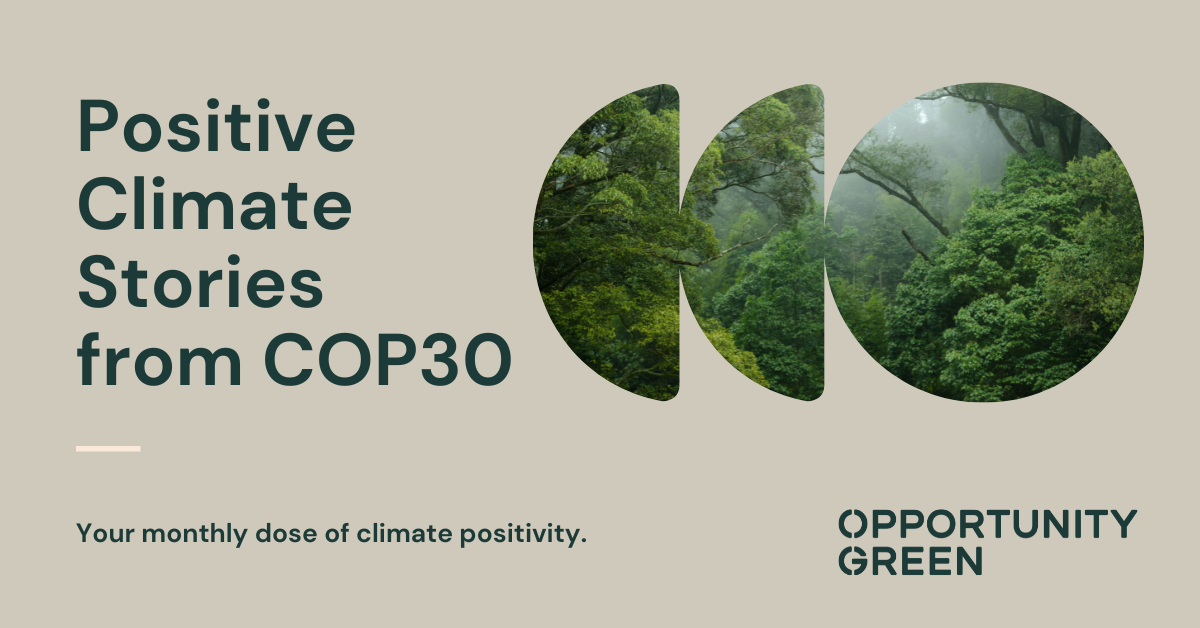Positive Climate Stories in October
October has brought encouraging hope for climate action – from wind power’s billion-pound savings to a landmark greenwashing ruling and the creation of the world’s largest marine park.
1. Wind power has saved the UK over £104bn on energy costs since 2010
Since 2010, wind power has cut £104bn from UK energy costs since 2010 – proving that renewable energy is as good for our finances as it is for the planet.
Researchers at University College London found that wind energy lowered electricity bills by £14.2bn between 2010 and 2023. But the biggest savings came from gas: because wind energy reduced gas demand, the UK avoided building new gas infrastructure, resulting in £133.3bn in savings.
During the same time, households paid about £43.2bn in green energy subsidies through their electricity bills. Even after these payments, the study estimates that UK energy bills were £104.3bn lower than they would have been without wind power.
This analysis covers 2010 to 2023 and does not include the spike in gas prices in early 2022 following Russia's invasion of Ukraine. Nevertheless, Colm O’Shea, lead author of the report, noted that wind power saved £104bn – an amount greater than the £90bn extra the UK spent on gas since 2021 due to rising global prices.
“This study demonstrates why we should reframe our understanding of green investment from costly environmental subsidy to a high-return national investment,” he said to The Guardian.
This research shows that investing in renewable energy isn’t just good for the planet, it’s smart economics too.
2. Court rules TotalEnergies misled public in first greenwashing judgment against oil industry
In a global first, a court has ruled that an oil and gas major misled the public by greening its image. This greenwashing case against TotalEnergies was launched by Friends of the Earth France, Greenpeace France, Notre Affaire à Tous, with support from ClientEarth in 2022 as a response to their name change from Total.
The Court ruled that TotalEnergies' advertising was illegal because it misled consumers by giving the impression the company is part of the solution to climate change when it is in reality continuing to promote and sell more fossil fuels. Specifically, TotalEnergies claimed it put “climate at the heart of its strategy, with the aim of providing cleaner, safer and more affordable energy” and had set the ambition to achieve net zero by 2050. However, the Court found these claims misleading because the company was continuing to increase its production and investment in oil and gas. This was at odds with scientific advice aligned with the Paris Agreement, which requires an immediate reduction in fossil fuel production.
This is the first greenwashing judgment ever issued against the oil industry's net zero narrative. The Court ordered that within one month, TotalEnergies must cease the unlawful advertising and display the judgment prominently on its website for 180 days, or face fines of €10,000 per day.
The ruling is expected to have a knock-on effect on Big Oil's marketing across other jurisdictions. “This landmark judgment sends a clear warning shot to other oil and gas majors in Europe and beyond: claiming to be part of the transition while backing new fossil fuel projects comes at a tried-and-tested legal price,” said Jonathan White, lawyer for ClientEarth.
3. World’s largest marine park has been created
After announcing its ambitious plan at the UN Ocean Conference in June, French Polynesia has now made it official – adopting a decree that establishes the world's largest marine park.
The park spans the territory's entire exclusive economic zone of 4.8m square kilometres – nearly the size of the European Union. Of this vast area, 1.086m square kilometres will receive strong protection – twice the size of mainland France. Within this, 900,000 square kilometres around the Society and Gambier Islands are now fully protected by law, with commercial fishing and mining completely banned. With this addition, 78% of France’s ocean waters are now under some form of environmental protection or restriction.
By restricting harmful practices like deep-sea mining and bottom-trawling, the territory aims to safeguard their vast biodiversity. French Polynesia's waters host some of the world's healthiest coral reefs, along with sharks, whales and sea turtles.
The park balances conservation with cultural heritage. An additional 186,000 square kilometres is reserved exclusively for artisanal fishing, allowing local communities to continue traditional line fishing methods that have sustained Polynesian culture for centuries. A recent survey showed overwhelming support, with 92% of residents backing the protected areas.
This park demonstrates how modern conservation can preserve both biodiversity and cultural heritage, setting an example for global ocean protection.













